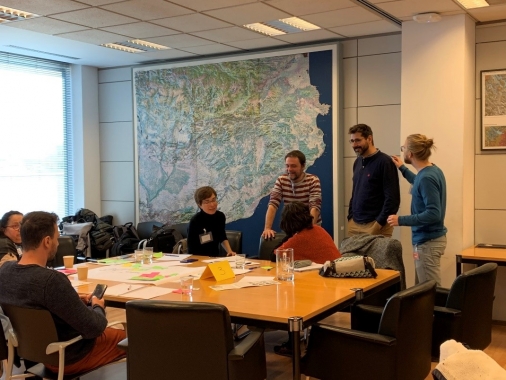HOUSEFUL Co-Creation Workshop I & II | Sabadell, Spain
Housing Europe's take-aways from Catalonia
Brussels , 20 July 2020
The first workshop of the HOUSEFUL project on Circular Economy in the residential sector in Catalonia took place the 9th of March at the Departament de Territori i Sostenibilitat de la Generalitat de Catalunya and was hosted by L’Agència de l’Habitatge de Catalunya. In the workshop other project partners participated including LEITAT, AIGUASOL, HOUSING EUROPE, ITEC, and WE&B. The workshop was followed up by a co-creation session with the aim to produce a joint action plan for the provision of social support evolving around the project at Bloc dels Mestres, Sabadell.
Background – Co-creation Workshop I
The objective of the first co-creation workshop was two-fold. The first objective was to identify the desired futures of the housing sector, and social housing in particular, within the circular economy context in Catalonia. The exercise followed the method of the River of Life metaphor[1] trying to envision what is the desired future for 2030 where participants should identify enablers and barriers to achieve that vision. These were the four future scenarios selected:
- Community cohesion will be a central element in 2030. Buildings will be created by and for the community. At the urban level, buildings will not be isolated from each other, but there will also be cohesion among neighbourhoods. The circular economy will have a key role in strengthening this cohesion.
- Social housing is circular meaning energy neutral and reducing linearity of materials, water and waste streams. Housing stands for comfort of users. Housing cooperatives should mainstream and become at least 10% of new housing promotions.
- An increase in the empowerment in the process of user. The circular building has shared spaces that enhance collaborative practices and also it is much more auto sufficient in terms of resources, than current buildings.
- Buildings would be auto sufficient and comfortable, sustainable and with continuous automatic maintenance of the façade. Communities would be empowered and aware of their activities and living in harmony with the environment. Cities would be sustainable without noise, waste and would be efficient.
The second objective was to validate the co-creation ideas that emerged during the previous consultation process with key actors in the sector and the project consortium to explore how can HOUSEFUL contribute to materialise the future scenarios previously identified. These were the four co-creation ideas that were validated:
- Visualising the benefits brought by the HOUSEFUL solutions.
- Reducing the costs of the HOUSEFUL solutions.
- Providing social support in the long-term.
- Developing a training protocol for the use and maintenance of the HOUSEFUL solutions.
Different working groups were developed to validate each of the ideas to further develop them in the next co-creation session.
Housing Europe, together with L’Agència de l’Habitatge de Catalunya, Sostre Cívic (SCCL), ICAEN and Societat Orgánica, formed the working group focusing on “Providing social support in the long-term”. This idea referred to the long-term management of building renovation and the HOUSEFUL solutions involved in it. Social housing management involves uncertainties in terms of shifting inhabitants, managers, etc. Therefore, it is necessary to provide ideas for the social accompaniment of (HOUSEFUL solutions) in the long term, taking into account scenarios of possible changes.
Co-creation II – key takeaways
The second workshop of the HOUSEFUL project on Bloc dels Mestres, Sabadell, took place the 10th of July in online version through Micrsoft Teams and the Miro app and was facilitated by the consortium partner WE&B. The workshop was formed by the members of the working group focusing “Providing social support in the long-term” - Housing Europe, together with L’Agència de l’Habitatge de Catalunya, Sostre Cívic (SCCL), ICAEN and Societat Orgánica.
The objective of the workshop was to further develop the idea and produce a joint action plan to effectively implement the provision of social support in the long-term for the building Els Mestres in Sabadell.
The first step in developing the idea was to work on a common definition that considered its replication to other demo buildings in HOUSEFUL, the future scenarios of the building and the three tenure types of the demo building (social rental, multi-occupied apartments and social emergency homes). Some key elements identified as important in the provision of social support were:
- Foreseeing support provision in during the change and rotation of tenants in the building.
- Considering the building as an integral part of the neighbourhood and take advantage of the common areas for the provision of the social support and engage the surrounding tenants to create a community and governance structures.
- Considering different age ranges when establishing the levels of social support.
The second step was to agree on a series of assumptions and requirements when providing social support in the long-term. Some of the key assumptions found related to the commitment and engagement of tenants and neighbours in the development of the HOUSEFUL solutions as well as the collaborative attitude of the municipality towards the project. Some of the requirements included visualising benefits and progress of the HOUSEFUL solutions accessible and attractive and potentially placing the information point in the common spaces.
The third step was to list the beneficiaries and responsibles of the provision of social support with an emphasis on the definition of the role of “Social Assistant” as a new actor in charge of the facilitation, mediation and capacity building of the community.
The next stage in this co-creation process will be to identify the needs and barriers for the implementation of the action plan between July and October. A third co-creation workshop will be organised to validate the action plan and integrate it into the HOUSEFUL project timeline and work stream.
[1] River of Life is a group facilitation technique using visual narratives to help people tell stories of the past, present and future.



Leave comments